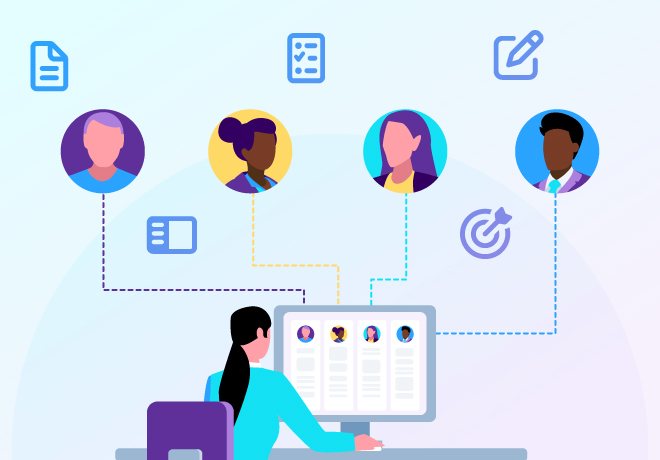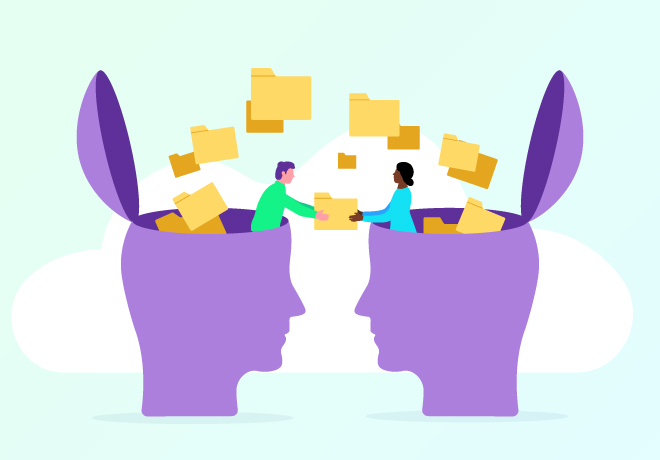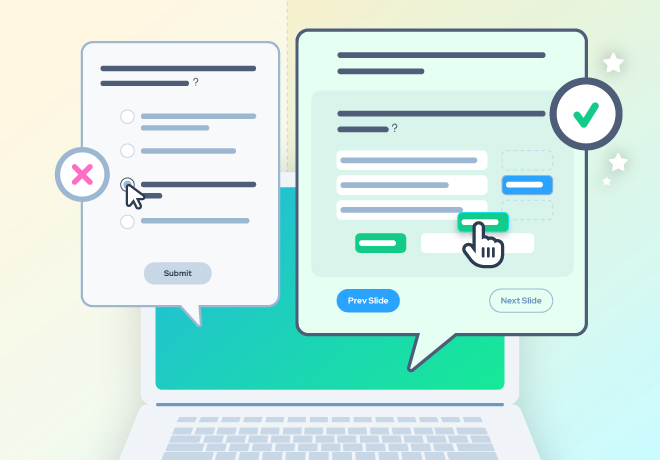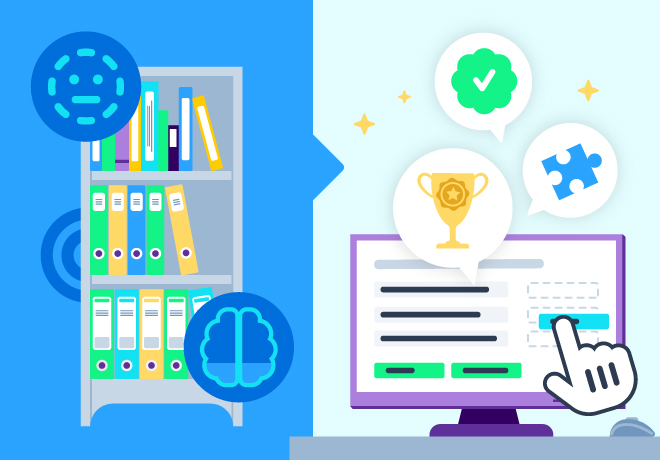
Your guide to finding an LMS that meets your training needs

Related articles
Get valuable eLearning insights to your inbox.
Listen to Neovation’s Demystifying eLearning podcast generated with NotebookLM!
Listen to our podcast on your favorite platform!
It doesn’t matter what you are buying; when you get overwhelmed with options and a lack of information, sometimes the easiest decision is not to decide. How can you tell what’s good or bad, what will work for you or not, what is worth the price, or is a good deal, or worse, a bad choice? Online review sites may be helpful, but there are so many of THOSE as well that you can double down on the overwhelm and feel even more paralyzed. The bigger the price tag, the worse the analysis paralysis.
This applies to our professional purchases as much or more than it does to our personal ones. It’s much harder to get out of a contract for services than it is to return an ill-fitting shirt to an online retailer. We all want to know what to look for – and how to evaluate what’s good. With that in mind, in this post, we’ll go over some things to consider when searching for an LMS, including:
- Must-have LMS features: Does the LMS meet your requirements? Does it have the features that you need for your team to succeed?
- Learner experience: What will the learner experience be like for your team? Will they be able to do things, like finding their courses, quickly and easily?
- Content creation and deployment: What content creation capabilities does the LMS platform have? What about content deployment?
- Data security: What permission levels and security access are available within the LMS? What protection does it offer against breaches, malware, hacking?
- Automating LMS training admin: Does the LMS allow you to automate things like learner enrollments, notifications, user imports?
- LMS pricing and future growth: Is the platform’s pricing rigid or does it grow and evolve with you, as your organization changes?
- LMS reporting and analytics: What types of reports can the LMS run? Are they customizable? What data does the LMS collect?
- Customer service and support: If the support tiered, what are the differences between the offerings of each level? How long will you have to wait for assistance? A resolution?
- LMS integrations: Does the LMS platform offer integrations with other software?
- Ongoing LMS development: What are the LMS vendor’s plans for future growth? How often are updates released?
But first…
Finding the right LMS for you – not necessarily the best LMS
So, what do you look for in a good learning management system (LMS)? There are hundreds of learning management and online training platforms on the market. Some names are more familiar than others, but that doesn’t necessarily mean they are better – they may just have larger marketing budgets. Some may be scrappy new upstarts – can you rely on them to deliver what you need and be around for the long haul?
When you start your research into buying a new LMS, you will likely be researching which LMS service you want to subscribe to versus buying a piece of software that comes in a shrink-wrapped box, like a video game. Most LMS platforms are SAAS – Software as a Service – hosted online, where you gain access to your unique corporate portal account via secure logins. Nothing is installed, downloaded, or accessed from your own computer or network. It’s a tried-and-true software model – many of the platforms and services you use online are delivered this way.
So, you go online, start doing online searches, and find out there are hundreds – HUNDREDS! – of eLearning service providers. How do you know who to choose?
Here’s the answer.

You choose the one that meets your specific needs the best – that can help you deliver your corporate training strategy in a way that engages learners and changes learner behavior through measurable knowledge retention.
Things to consider when searching for an LMS
It’s not so much about finding a “good” LMS as it is about finding the “right” LMS for you. Before choosing a new LMS, and a new LMS vendor, be sure to find out the answers to these questions – before you buy. The list is a good starting place to begin determining what you need to look for as you begin your investigation into the right LMS for you. Use this list to start planning your online training strategy and software selection – the two go hand in hand. You should also be able to answer these questions if the LMS vendor flips them around to find out what you need.
Do the LMS features match your “must-have” list?
Keep your LMS search focused on your actual needs, your company’s training strategy and desired training outcomes, your internal workflows, your overall training environment, and any changes you want to make. Your goal is to have your learners and training team succeed. Have you thought about:
- Customization for different groups of learners?
- Personalized learning plans?
- Third-party content libraries?
- Built-in content creation studio?
- Integration with webinar platforms?
Ask your shortlist of LMS vendors about these features.
The learner experience
Your company’s needs are unique, as are the needs of your learners. Are the needs of your workforce being met? Will your learners be able to easily and enjoyably:
- Find their courses and complete their training?
- Have quick access to specific content or a quick way to check upcoming deadlines?
- Get updates on what courses they're enrolled in, how far they’ve come, and how much training they have left to do?
Will your LMS provide learners with customized home pages designed to suit your learners in your environment following your workflows? Ask LMS vendors how they customize their LMS for your learners — and hopefully, they'll go far beyond just sticking your logo in the corner and adding your corporate colors.
Better yet – ask them why your learners will love their platform, and then ask them to show you.
Content creation and deployment
So many questions, like:
- Does their LMS include an easy-to-use content creation feature?
- How easily and quickly can your team create multimedia content, including videos with narration, animations, and games, add PDFs and eBooks, and offer quizzes?
- Will you need to purchase additional software or online tools?
- Is it easy to add your existing content or third-party content?
- What’s involved in updating content after it’s loaded and deployed?
- Is there version control or do learners only get the updated content? (There are advantages and disadvantages to either method.)
- Are learners automatically enrolled in the most recent version of courses they need for compliance, certification, and licensing requirements?

Data security
Your employees share their personal data with you based on the implicit understanding that their personal information is safe. Every software vendor you consider – LMS or otherwise, needs to be able to talk about and document their data security protocols. At the same time, your management team needs to be able to access and assess learner data easily to track learner progress. Data security should be intelligent, not onerous, invisible, and not a barrier to being used to measure results.
You’ll want to ask about:
- Permission-based access to information at various levels of access
- Security of group chats and social learning channels used for collaboration
- Access controls to reports, test scores, and learner records
- Protection against data breaches, hacking, and malware
- Data hosting backup, and storage, ensuring compliance with industry security standards
Automating your training administration
Intelligent training automation can reduce the burden of training administration on your Learning and Development team. Can your LMS:
- Automate enrollments?
- Send notifications to learners to start or continue with their training?
- Remind learners when their certification may lapse, re-enrolling them in appropriate training in advance of their certificates’ expiration?
- Generate and email regular reports?
- Import user data?
- Import course content from course libraries with minimal customization?
Pricing and future growth

Companies grow, downsize, merge and acquire or get acquired. You may have seasonal surges in employee counts, depending on your industry. Here are some considerations that may affect pricing:
- How does the vendor measure the number of learners in their system – is it by user count or by active enrollment – meaning that the vendor only counts users who log into training in a given month as active users?
- You want to know what you’re paying for your new LMS — and how that will change in the future as you add learners, add content, or both.
- Ask LMS vendors how their charges will change as your company usage grows.
- Make sure you know what’s included and what you will be paying extra for. You want to avoid paying a higher price for features you are unlikely to use.
- Is onboarding, implementation, and ongoing support included in the cost? Are there limits to support service delivery or tiers of support you need to consider to ensure your needs are met?
Reporting and analytics
Your LMS exists to show you that learners are making progress. You may also need to show regulators or auditors that your learners have completed the compliance training required to maintain their certification standing. You’ll want to ask about:
- What types of learner progress and performance data does their LMS collect?
- Will your admins be able to customize reports?
- Can reports be generated automatically?
- Can it provide clear data visualizations that you can use to demonstrate the value of training and the LMS to your C-suite?
- Does your LMS integrate with business intelligence (BI) tools, such as Microsoft PowerBI™?
- Will the LMS be able to generate reports and analytics that meet your needs when reporting on compliance training to third-party auditors?
Customer service and support levels
Good support is crucial to your success – you are buying a complicated piece of software, and you will have people with various levels of comfort and experience using it. The need for support is a given. Make sure to ask these questions:
- Are there tiered levels of support, and what are the differences between them – and the costs?
- How long will you wait for a resolution if you need assistance or experience an incident? This is not necessarily how many rings it takes for them to answer the phone (totally acceptable if your call goes into a voicemail queue for routing to reps for a callback.) The core question is how soon you can expect results and resolutions.
- What are the support team’s hours of operation, and how do they deal with clients outside their time zone? What about holidays?
- Is there a prioritization protocol for urgent or emergency requests? Anything less than 24x7x365 emergency response by an actual human who knows your system inside and out is simply unacceptable – how long will it take for them to respond?
- Support includes setting you up for a successful launch of your training program. Does your vendor provide comprehensive implementation services and administrator training on deploying and using the LMS?
- Are there tutorials and help for your admins for the lifetime of your relationship?
- Can you see their online help system to see how comprehensive it is?
Ask why not if the vendor doesn’t deliver training to their own team using their platform. That could be a huge red flag!

Integrations with other software
Your LMS may need to “talk” to other software that you use – and have other best practices and ease of use features to improve the user experience – for admins and learners alike. Does the platform:
- Have single-sign-on (SSO) capabilities to minimize user login errors (and stress)?
- Integrate with eCommerce, HRIS, data warehouses, and webinar or virtual classroom platforms?
- Automate user synch data exchanges with your HRIS or talent management system?
- Allow for custom integrations to other applications to prevent having to update multiple systems manually.

Ask vendors about integrations with all the elements of your training and talent management ecosystem.
Ongoing product development
This is the beginning of a long-term relationship. In the same way that your company’s needs will shift over time, so will the standards of eLearning technology. Future-proof yourself against potential issues by asking:
- What is your vendor's process to anticipate future trends and technologies?
- Is their platform built to grow and evolve to meet changing industry standards easily?
- How often do they release updates?
- Are client requests considered when planning feature improvements?
- Is there a schedule for upgrades, or are they ad hoc – and how much notice is provided (and how) if the platform has to go offline for scheduled maintenance?
- What new features are already in the development pipeline?
We have many supporting articles to support you in your search for the right LMS – everything from preparing for your first conversation with a sales representative to assessing a product demo and many more. View the other articles in our online training platforms guide, which is an ever-expanding resource covering the options in the market that are available to you. Our learning hub can also help you understand the other parts of your eLearning ecosystem, such as eLearning authoring tools, microlearning, gamification, learning analytics suites, or how to create custom eLearning courses.
Buying an LMS is a big decision with a hefty annual price tag and will affect every level of your company. Take your time making the decision, and dig in as deeply as you need to – with your internal team to ensure you understand your needs (“Helloooo, Training Audit”) and with your vendor candidates as you interview them. Having a set of empirical criteria and a method to evaluate and measure how many boxes each prospective provider checks off will guide you to the right decision. Time to leave analysis paralysis behind and make a strong, informed decision! Well done!

With 15+ years of online marketing and online learning experience, Susan loves to share insights about where these two ROI-building practices can intersect and complement each other for your business or organization.
Become part of our L&D community
We publish a new learning hub article — full of useful, practical topics — weekly.
Not sure where where you want to start? Jump into one of our recently published articles and see where it takes you!








-svg.svg)
-svg.svg)
-svg.svg)
-svg.svg)